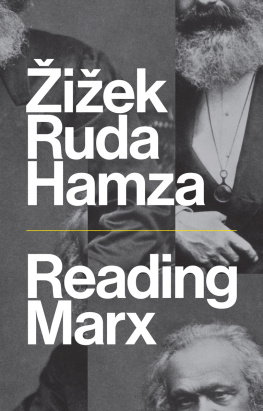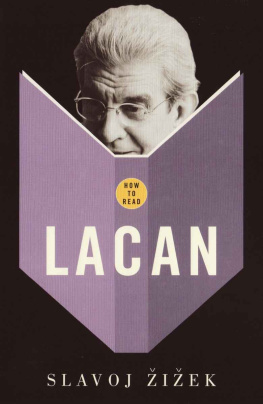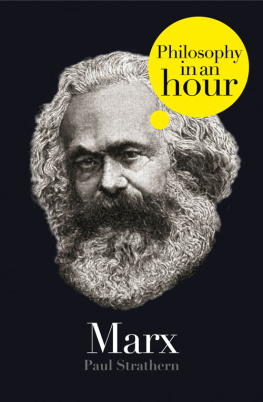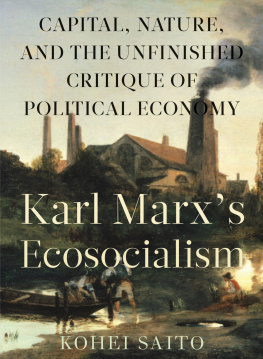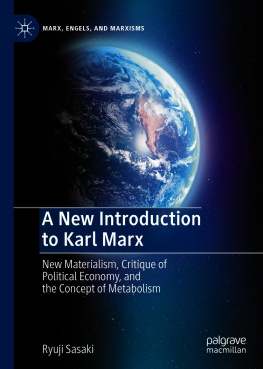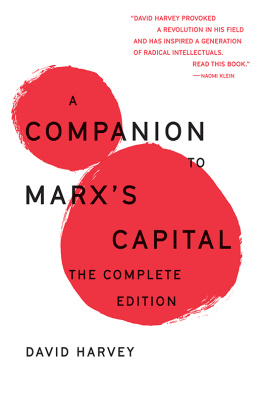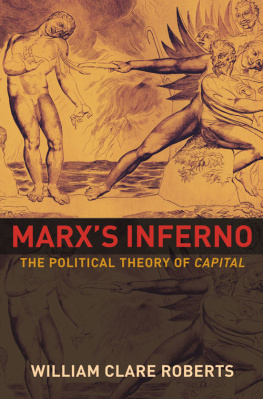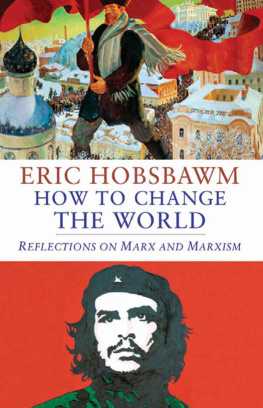Contents
Guide
Pages

Reading Marx
Slavoj iek, Frank Ruda, and Agon Hamza
polity
Copyright Slavoj iek, Frank Ruda, and Agon Hamza 2018
The right of Slavoj iek, Frank Ruda, and Agon Hamza to be identified as Authors of this Work has been asserted in accordance with the UK Copyright, Designs and Patents Act 1988.
First published in 2018 by Polity Press
Polity Press
65 Bridge Street
Cambridge CB2 1UR, UK
Polity Press
101 Station Landing
Suite 300
Medford, MA 02155, USA
All rights reserved. Except for the quotation of short passages for the purpose of criticism and review, no part of this publication may be reproduced, stored in a retrieval system or transmitted, in any form or by any means, electronic, mechanical, photocopying, recording or otherwise, without the prior permission of the publisher.
ISBN-13: 978-1-5095-2144-9
A catalogue record for this book is available from the British Library.
Library of Congress Cataloging-in-Publication Data
Names: Zizek, Slavoj, author.
Title: Reading Marx / Slavoj Zizek, Frank Ruda, Agon Hamza.
Description: Medford, MA : Polity, 2018. | Includes bibliographical references and index.
Identifiers: LCCN 2017053287 (print) | LCCN 2018002710 (ebook) | ISBN 9781509521449 (Epub) | ISBN 9781509521401 (hardback) | ISBN 9781509521418 (pbk.)
Subjects: LCSH: Marx, Karl, 1818-1883.
Classification: LCC B3305.M74 (ebook) | LCC B3305.M74 Z59 2018 (print) | DDC 335.4092--dc23
LC record available at https://lccn.loc.gov/2017053287
The publisher has used its best endeavours to ensure that the URLs for external websites referred to in this book are correct and active at the time of going to press. However, the publisher has no responsibility for the websites and can make no guarantee that a site will remain live or that the content is or will remain appropriate.
Every effort has been made to trace all copyright holders, but if any have been inadvertently overlooked the publisher will be pleased to include any necessary credits in any subsequent reprint or edition.
For further information on Polity, visit our website: politybooks.com
Notes on the text
The first chapter, Marx Reads Object-Oriented Ontology, was written by Slavoj iek, the second chapter, Marx in the Cave, by Frank Ruda, and the third, Imprinting Negativity: Hegel Reads Marx, by Agon Hamza. The introduction and conclusion are coauthored.
Introduction
Unexpected Reunions
This book is written by three philosophers. Its aim is to find different (and yet unexplored) ways to read Marx. This collective project dedicated to Marxs work (Capital being one of its primary sources, though by no means the only one) is situated within the specific philosophical and political conjuncture in which we find ourselves. It is, indeed, a peculiar, situation, though not entirely unique. To demonstrate its peculiarity as well as its uniqueness, let us take a quick look at the fairly short history of Marxism and communism. Marxism has a short history in comparison to other histories, such as the victorious history of democracy, whose flawed political form in its infancy excluding women and slaves in ancient Greece took much longer to actualize than one usually likes to remember. If we look back at previous historical situations and the state of Marxism or communism within them, we can recognize certain similarities with the present one. Similarities, because conceiving of emancipation (or revolution) within these historical configurations seemed almost as impossible then as it does today (maybe even more so, if impossibility knows degrees).
From a Marxist perspective on the history of Marxism, we can therefore immediately learn that such impossibilities (for example, of emancipation) are not strictly ontological, but are always historically determined and thus specific. The impossibility of conceiving of an overall transformation of a given political system is not simply conceptual, but is also determined by a concrete historical situation; it hinges on a specific articulation of particular points of impossibility. From a Marxist perspective on the history of Marxism, modal categories show their historical face. But this is not all we can learn from such a perspective. We can also learn that the practices gathered under the name of Marxism or communism often implied the conversion of a historically specific impossibility into a new possibility (of emancipation); a modal transformation that also always implied a kind of self-affirmation, a Selbstbehauptung, of Marxism itself, of its central assumptions, its axioms. Just think of the claim that there could be a different organization of society, which had first to be established and then found a historical referent in the Paris Commune, which was then taken as the starting point for transformations in Russia.
But, as many others non-Marxists have later claimed, from the history of Marxism one can also, and should, ultimately learn that converting what previously appeared to be impossible into a new possibility comes at the high price not only of tolerating violence and creating suffering for millions, including unspeakable injustices, but also of producing new structural impossibilities or, simply displacing previous ones. So, what appeared to be a practical conversion, from such a perspective, demonstrates that precisely such impossibilities should be left untouched, as it will otherwise only result in a catastrophe.
So, where do we stand today? What is our position in terms of this history?
First, the year 2017 marked the 150th anniversary of the publication of Marxs first volume of Capital. This historical fact in itself raises a series of questions (about the philosophical, ideological, epistemological, political, and potential validity and relevance, etc., of Marxs thought), which are determining for as well as determined by the coordinates of our present situation and the history from which it originated. These questions are directly as well as indirectly addressed in this book. What you are about to read is thus not a celebration or unconditional defense of Marx; nor is it an attempt to dissect what is living and what is dead in Marxs thought in the way that Bernedetto Croce once infamously sought to divide Hegels philosophy into contemporarily relevant and irrelevant parts. Rather, what you can expect is an attempt to read and thus think with Marx as a contemporary.
Second, our common belief is that even in the present philosophical and political conjuncture, there is a conceptual need that is yet to be determined. A need for Marx to paraphrase the early Hegels famous formula of a need for philosophy a need to compel us to return to Marxs oeuvre. Yet, we assume that this return, at this point in history, can only be of a philosophical nature. One might even say that the need for philosophy is directly related to the need for Marx. Why? The present historical situation is generally perceived as one in which we can observe an increasing closure of possibilities and of practical initiatives for emancipation; one can see everywhere a blatant regression to previous forms of domination and use of political power that for long seemed to have been invalidated by history but today returns with a vengeance. Think of the rise of new authoritarian modes of politics, including both populist nationalist movements and parties, and even more authoritarian forms of exploitation and value production the infamous capitalism with Asian values (which after all has nothing to do with Asia as such), which seems to undo what Fukuyama assumed to be the end of history, namely the linkage of democracy and capitalism including what may have appeared historically abandoned forms of exploitation such as slavery, etc. Yet, if this need for Marx today is located in a conjuncture that is also determined by the history of Marxism, one cannot properly understand it without also taking into account the peculiar fate that Marxs thought has lived through.

